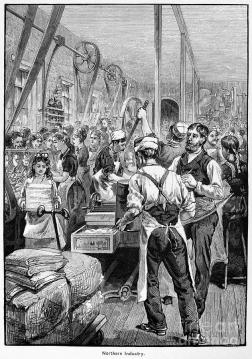Women in the Furniture and Upholstery Trades –
 Of working men’s clubs we have in England alone, of one kind or another, about 700; of clubs for working women, so far as we know, but one, and that is one not provided for the class of women to whom we here more particularly refer. Is not this something for our working women to think about? These clubs provide comfortable rooms and attractive amusements, books to read, and in most cases classes for instruction and lectures. Why should not working women have the same advantages? Think of it, working women in the furniture and upholstery trades,—think of it, and act upon the suggestion it offers you.
Of working men’s clubs we have in England alone, of one kind or another, about 700; of clubs for working women, so far as we know, but one, and that is one not provided for the class of women to whom we here more particularly refer. Is not this something for our working women to think about? These clubs provide comfortable rooms and attractive amusements, books to read, and in most cases classes for instruction and lectures. Why should not working women have the same advantages? Think of it, working women in the furniture and upholstery trades,—think of it, and act upon the suggestion it offers you.
“Nations which owe their origin to the conquests of successive invaders, however generous and noble in their natures such invaders may be, are not those in which the true rights of women are speedily recognized. In the first place, the wives of the invading race are sought amongst their captives; and it is not likely that the daughters and wives of the slain or defeated could very readily submit themselves to the wills of their imperious and exulting captors. Harsh and cruel treatment systematically indulged in, watchful suspicion, and the enforcement of a slavish spirit of humility and obedience, would, on one side, naturally be the weapon of the enslavers. Falsehood and treachery, the vices natural to a state of fear and degradation, would be the weapons of the enslaved. Thus a relationship would spring up between the sexes anything but honourable or satisfactory to the one or to the other; and it would require long, long years of successive generations to modify that relationship, and gradually beget a feeling of mutual respect, regard, and equality.”
Thus, some years ago, wrote the editor of one of our art-journals,—Mr. A. H. Wall, more recently editor of The Ladies; and if we glance back over our history from the time when the law first began to care for the conditions of mothers, daughters, and sisters, and put a higher value upon their lives than it did the lives of beasts, to the time when it regulated the exact thickness of the stick with which a husband might beat his wife, and so on to the present time, when no man may beat his wife with impunity, we shall perhaps regard Mr. Wall’s theory as one in which there may be something to think about. We note it here as affording a probable explanation of the fact, that in all the movements in which working men have recently been active for the increase of wages and the elevation of their social and political position, we hear nothing about strikes for increase of wages amongst a much worse-paid class of workers, —nothing about the elevation of a class less elevated than the working man,—in short, nothing at all about the working woman.
It is true that in giving expression to a kind of afterthought, the Marquis of Westminster, at the inaugural meeting of the “Grosvenor Club for Workmen,” said, “One always feels that we are a little selfish about these matters;” and without reference to the educational and other solid advantages of the Club, ventured to express a timid hope, that when a new hall, not yet built, was in existence, as it may be, to see its benches well filled with the wives and female relations of the members. We think if the Marquis had said entirely instead of a little selfish, he might perhaps have been nearer the mark.
Now, in the furniture and upholstery trade we have a very large number of female workers, and on that principle of self-help which we strongly upheld in our leader of last week for the men, we now urge our own special working women to come nobly to the fore, and do for themselves that which the men are now doing for themselves. A club for working-women, embracing all those advantages which belong to the Grosvenor Club, might, we are sure, be quickly and permanently established; and if they will but commence a movement in its favour, we venture to promise them prompt and powerful aid and patronage from ladies who have great influence, and who are always willing to stretch out helping hands to aid a good cause, from which their poorer and less fortunate sisters may derive permanent and important benefits.
The Furniture Gazette – (London) May 10, 1873
– Jeff Burks




